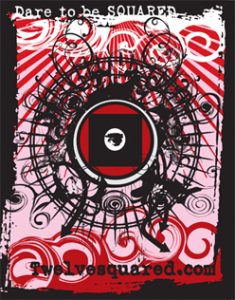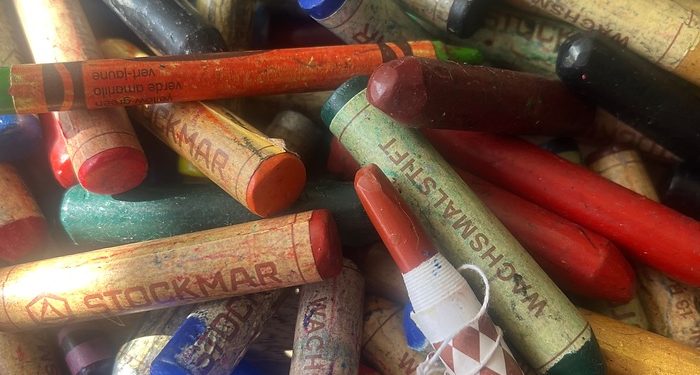We’re halfway into the 2024 Crayonuary 30-Day Challenge and I’ve been getting questions about crayon recommendations beyond Crayola. I have A LOT of suggestions! I’ve been crayon journaling for over 5 years and I’m always looking for new crayons to experiment with. Sure, the Crayola 32, 64, or 128 packs are great, but there’s a whole world of waxy wonderment to experience.
70-year-old crayons
My favorite crayons are over 70 years old! They are “No. 23 Gotham Marking and Checking Crayon” by Binney & Smith Inc. They are fat black crayons that were used in manufacturing industries before Binney & smith became Crayola in 1934. I found these crayons years ago in my dad’s basement and he must have gotten them from my grandfather.
They are nice and fat, and very waxy. I have to press hard on them to make a deep line. I like how they feel in my hand plus there is something about having that connection with my dad and my grandfather that makes them special.
First on the Block
My second daughter was born with hand differences – she only has four fingers in each hand. My wife, Linda Chido, homeschools our kids and when Georgia was younger, Linda was on the hunt for crayons that Georgia could hold. The best crayons Linda found were block crayons and they were our daughter’s first crayons. In fact, they were all of our kid’s first crayons.
Block crayons are solid blocks of vibrant, high-quality, pigments usually made from beeswax. They come in a variety of colors and are primarily used for drawing and coloring. Unlike traditional crayons, which are stick-like in shape, block crayons have a flat, rectangular form, making them easy to grip and manipulate. I like the fact that I can create fine lines and thick lines in one stroke, just by moving my hand slightly, this was a game-changer for me. My two favorite block crayon brands are Stockmar and Filana, and I have a mixture of both.
The Swiss Connection
Caran d’Ache has been creating color and writing products in Geneva since 1915. Usually, they are found in art stores, which is where I found my first Caran d’Ache wax pastels. They are shaped like regular stick crayons but they are oilier and produce a much smoother line. The colors are very rich and I use them often in my crayon journaling. Caran d’Ache has two product lines – one that is more like oil sticks and one that is water soluble and can be blended with water and a paintbrush.
Unraveling the Fine China
China markers, also known as grease pencils, are wax-based pencils that have a similar makeup to traditional crayons but they are thinner and encased in a peel-off, paper-wrapper. China markers are made of hardened colored wax and are great for mark-making on hard, glossy non-porous surfaces.
I have vivid memories of these peel-down crayons from when I was a kid. My dad was a doctor and used china markers to make notes on medical scans. He kept them in his desk drawer. When I had to wait in his office while he finished rounds, I would sit at his big desk and draw with his china markers.
A contemporary version of china markers is Ooly crayons. They are china markers but a lot more fun! They are called Color Appeel Crayons and come in vibrant colors. Ooly makes all kinds of crayons in lots of shapes and sizes. So far, I have only used their Appeel crayons.
The Bees Knees
Many crayon companies have turned to beeswax as their key ingredient in manufacturing and non-toxic, food-grade pigments as safer crayon choices for children and the environment. I have found there is no degradation of color in the application of beeswax crayons. Most of my kid’s crayons are beeswax so that’s also what I have the most of in my crayon box. I particularly like the Sproutlings triangular crayons and Honeysticks which are thick and fat. Both are from New Zealand. There are a lot of beekeepers there – 6,735 according to Wikipedia!
Smooth Like Butter
I’ve been asked if pastels are the same as crayons. They are similar but not the same. Both are made with wax but crayons are mixed with a dry binder such as gum arabic, where oil pastels are a mixture of wax and oil. It is the binder that makes the difference. Also, the color saturation is different between crayons and oil pastels. Pastels usually have a richer, brighter, and smoother application so you don’t have to apply as much pressure. Oil pastels glide over the surface of the paper. I use Kingart’s Gel sticks and I also like the Marabu art crayon (which is a pastel).
I have found in my experimenting with many different types of crayons that no two crayons are made the same. Some are wrapped with paper casing, some are not. Some tend to be oily, some more waxy. Some crayons have very bright pigments and some are more muted. Every different type of crayon makes a different mark that gives me different effects—all the more reason to try them all and see which ones YOU like.
And if you find a crayon you love, please drop me a note at twelvesquaredart@gmail.com. I’m always up for trying new crayons!
P.S. I’m not affiliated with any of these crayon brands – they are just some of my favorites.
©2024 Ronald Gross

